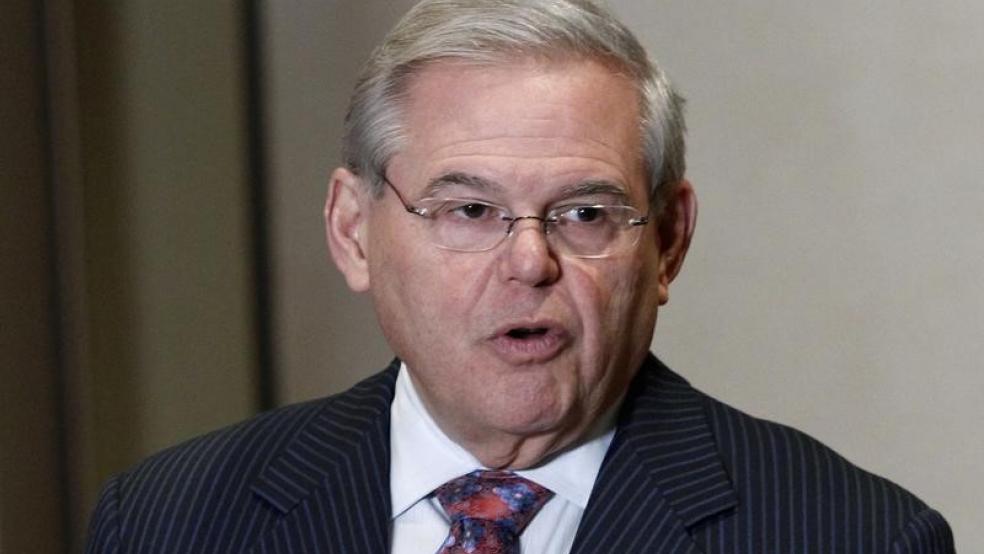The indictment of Sen. Robert Menendez (D-NJ) on political corruption charges last week is having an important ripple effect as Congress positions itself to respond to the Obama administration’s tentative deal with Iran to restrict its nuclear program.
Chair of the Senate Foreign Relations Committee before the GOP takeover of Congress in January, Menendez stepped down as that committee’s ranking member. He did so after he was criminally charged with swapping political favors with a Florida eye surgeon in return for luxurious gifts and trips.
Related: Cardin Replaces Menendez in U.S. Senate Foreign Relations Post
This is a mixed blessing for Obama. He loses a battle-tested lawmaker who championed immigration reform and other administration priorities. Menendez, however, also sharply disagreed with Obama about the direction of the nuclear talks with Iran and on normalizing diplomatic and trade relations with Cuba.
The N.J. Democrat has been closely allied with Sen. Bob Corker (R-TN), the new chair of the Foreign Relations Committee, in pressing for bipartisan legislation to preserve or even add to the sanctions if Congress disapproves of the final Iran nukes deal. A deal could be reached by early summer.
The Foreign Relations Committee is scheduled to take up legislation on April 14 when Congress returns from its two-week break. The legislation would withhold sanction relief for the Iranians under a final agreement and lawmakers have 60 days to review and vote on the final agreement.
Obama promised to brief and closely consult with lawmakers on the Iran agreement that was negotiated by Secretary of State John Kerry and European and Russian diplomats. However, administration officials reportedly believe Congress has no formal role in approving the final deal.
Related: Republicans Are Playing the Overreach Game on Foreign Policy
Obama announced the preliminary agreement in the Rose Garden and warned lawmakers that opposition to a compromise forged after two years of intense negotiations could risk war down the road. “If Congress kills this deal – not based on expert analysis, and without offering any reasonable alternative – then it’s the United States that will be blamed for the failure of diplomacy,” Obama said. “International unity will collapse, and the path to conflict will widen.”
With Menendez sidelined by the charges against him, Sen. Ben Cardin (D-MD), a liberal Democrat and close ally of the administration, has been elevated by his party’s leadership. He is now the ranking member of the Foreign Relations Committee. Cardin – a former U.S. House member – is a consummate dealmaker and strong advocate of many of Obama’s economic and foreign policy priorities.
Cardin, 71 said Thursday he wanted unanimity in Congress in terms of the final deal with Iran. He also said that aspects of the Corker-Menendez bill would have to be toned down.
Related: Hillary Clinton Blasts Republicans over Iran Nuclear Letter
“It’s important that we work as hard as possible for unity to give this country the strongest possible position in foreign policy,” Cardin told CQ Roll Call. The low-key Maryland Democrat said he’s always supported a congressional review of the nuclear deal.
Under the preliminary framework, Iran will reduce its centrifuges, restrict uranium enrichment for 15 years, cut its current stockpile of low-enriched uranium, and not build any new enrichment facilities during that period. The International Atomic Energy Agency would be granted access to all sites to confirm past and present activities.
These and other restrictions would produce a one-year breakout period. This means that if Iran later defaults on the deal, it would take its government at least a year to produce enough material to build one nuclear weapon compared with the current estimates of two to three months.
In return for these concessions, many economic sanctions that the U.S. and its allies have imposed on Iran’s economy would be suspended, rather than permanently lifted. Those sanctions could “snap back” if Iran were found to be cheating on the agreement.
Related: Republicans Rip into Iran Nuke Deal on Twitter
The early response from Capitol Hill was largely predictable, with many Republicans denouncing the agreement as a dangerous sellout. They say – as Israeli Prime Minister Benjamin Netanyahu insists – it would pave the way for Iran to develop nuclear weapons that could be used against Israel.
Sen. Tom Cotton (R-AR) said the administration has signed off on a list of dangerous concessions that could put “Iran on the path to nuclear weapons.” Sen. Mark Kirk (R-IL) charged the administration with appeasement. He said, “Neville Chamberlin got a better deal from Adolph Hitler” than Kerry and other U.S. officials negotiated with the Iranians.
House Speaker John Boehner (R-OH), who led a Republican delegation to Israel last week, called the agreement an “alarming departure” from Obama’s initial goals. He said Congress must fully review the deal before sanctions on Iran are lifted.
Related: Boehner, Heading to Israel, Slams Obama’s Treatment of Netanyahu
Democrats were more temperate, although a few praised Obama for a major foreign policy breakthrough. Rep. Earl Blumenauer (D-OR) hailed the deal as setting the stage “for a paradigm shift in the country and in the region.”
Cardin said he would need to examine the preliminary and final agreement before reaching a judgment. He said he would focus on how long it would take Iran to acquire a nuclear weapon if it violated the deal and the extent of verification requirement. “The administration will never agree Congress should have a role,” Cardin told CQ Roll Call. “There is going to be a philosophical difference, but we have to make sure whatever we do is constructive for the president in negotiating.”
As for Boehner, he said, “In the weeks ahead Republicans and Democrats in Congress will continue to press this administration on the details of these parameters and the tough questions that remain unanswered."
Top Reads from The Fiscal Times:





